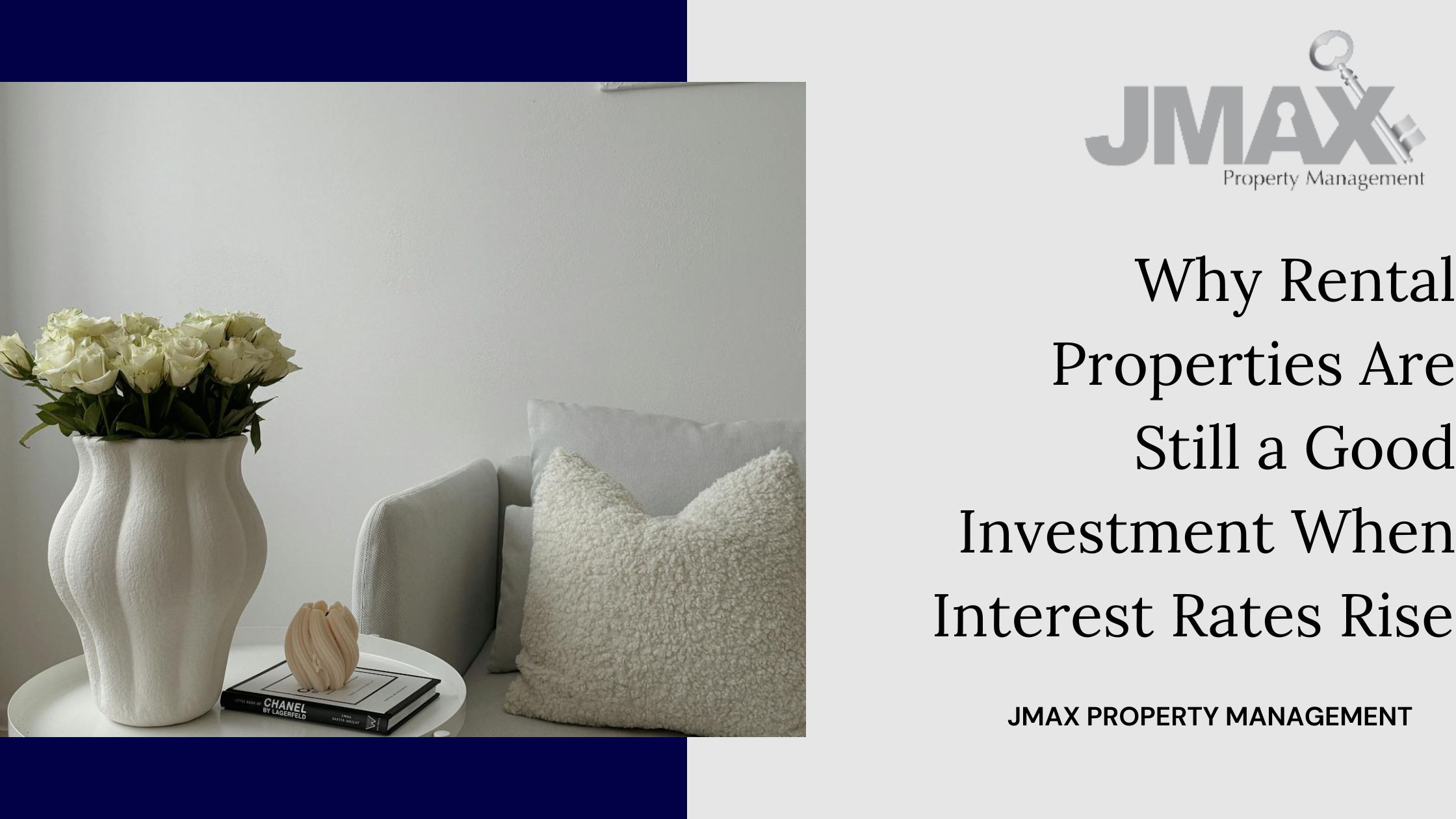
Key Takeaways
- Rental Demand Rises as Homeownership Declines
Higher interest rates make buying homes more difficult, which increases the number of renters—boosting occupancy and rental income potential for property owners. - Fixed-Rate Mortgages Offer Strategic Advantage
Locking in a low fixed interest rate before hikes can protect cash flow and increase profits as rents rise and inflation erodes the real cost of debt. - Rental Properties Provide Inflation Protection
As living costs rise, landlords can adjust rents accordingly. This helps preserve real income and shields property owners from inflation’s impact. - Long-Term Strategy Wins in High-Rate Environments
Disciplined, well-informed investors who maintain their properties and adapt to market shifts tend to outperform—even when borrowing costs are high.
Interest rates ebb and flow. Over the years, they have risen, fallen, and risen again. For rental property owners and prospective investors, higher interest rates can feel intimidating. Yet history shows that rental real estate remains a profitable asset even in a high-rate environment.
Keep on reading this blog by JMAX Property Management to learn more about why rental properties are still a good investment when interest rates rise.
Understanding the Context of Rising Interest Rates
When financial institutions raise rates, borrowing costs immediately climb. Mortgages become more expensive, reducing affordability for many buyers.
That scenario often slows down home-buying activity, which can sap demand in the owner-occupied housing market. That initially may seem like a negative for real estate investors, but in fact, it often creates opportunity.
Because fewer potential buyers can step into the market, more households turn to renting. That increased demand typically pushes rental rates higher.
Meanwhile, existing rental property owners with fixed-rate mortgages continue to benefit from relatively low payment obligations, while enjoying greater rental income. The dynamics of supply, demand, and locked-in financing work in a property owner’s favor.
Consistent Cash Flow Becomes Even More Valuable
Rental properties generate recurring income, which, when managed properly, provides stability and resilience. As interest rates climb, other investment vehicles may falter. Bonds may offer higher yields, but their prices can be volatile.
Stocks may suffer from economic uncertainty. Rental properties, on the other hand, produce predictable monthly cash flow from tenants who need housing regardless of wider financial conditions.

Moreover, rental income often adjusts upward in response to market shifts. Landlords can increase rents over time, particularly if demand remains strong. At the same time, operating expenses may remain relatively stable in the short term, leaving owners in a strong position to cover their costs and even expand profit margins.
Equity Growth Still Happens
Rising interest rates generally slow down overall property price appreciation, but that doesn’t mean equity growth grinds to a halt. Renters often look for long-term leases, occupying properties for multiple years.
During that time, if owners are diligent about maintenance, upgrades, and keeping the property in top condition, they preserve and often enhance its value.
In an environment of higher rates and subdued buyer activity, well-maintained rental units stand out. Buyers seeking investment properties or tenants may be drawn to quality, well-managed units, and owners can command a premium. Over time, this can translate into more solid, defensible valuations.
Hedge Against Inflation
Interest rate hikes often accompany efforts to temper inflation. In inflationary periods, everyday costs rise: utilities, groceries, and services. Rental property owners can adjust rents to reflect increased expenses and market levels. As rents climb, so does revenue, which helps offset inflation’s pinch and preserves real returns.
Inflation can also impart indirect benefits to owners. Property values tend to rise over time, particularly if supply struggles to keep pace with demand. If a property is financed under a fixed-rate mortgage, the real (inflation-adjusted) cost of that debt declines, while rental income becomes even more valuable.

Scarcity of Affordable Ownership Elevates Rental Demand
When borrowing becomes more expensive, fewer households can qualify for mortgages or choose to postpone buying. This challenges the owner-occupied housing market, but increases demand for rented housing. That heightened demand tightens vacancy rates and supports upward pressure on rents.
Existing owners with rental properties find themselves in a notably advantageous position. Their units become more sought-after, they can raise rents responsibly, and they often face fewer vacancies. They also benefit from economies of scale that individual owner-occupiers rarely enjoy.
Keys to Remember
Consistent rental demand is your ally in a high-rate world. People always need shelter. As borrowing tightens, renting becomes more attractive, increasing occupancy levels and allowing you to align your rents with market levels.
A fixed-rate mortgage becomes a powerful tool. You lock in a cost of capital long before rates rise, while inflation and rent growth erode that cost over time. Also, any efforts you make to maintain or improve your property’s desirability pay off. A well-cared-for unit attracts quality tenants and justifies stronger rates.
Finally, remember that rental properties can serve as a long-term inflation shield. You can raise revenue to match cost increases. As inflation persists, your mortgage becomes easier to service, and your asset (rent-generating and inflation-resilient) remains robust.
Leveraging Long-Term Strategy and Discipline
When interest rates rise, it can be tempting to get rattled. But history and data reveal that successful rental property owners think long term. They view each rate hike not as a crisis but as a strategic inflection point. They tighten operations, optimize income, and let rising demand work in their favor.

Disciplined owners revisit their financial structure regularly. They compare current earnings with carrying costs, challenge assumptions, and adapt rental rates with market shifts. They also reinvest in their properties in measured ways that reinforce value and justify rents.
Smart owners also consider diversifying their portfolios across areas or property types to hedge against localized slowdowns. Some explore shorter-term rentals where high demand can allow premiums, while others look to multi-unit buildings that deliver economies of scale.
Realism and Resilience
Rising interest rates bring a new level of financial pressure. Higher debt service can tighten cash flow, and cost increases can squeeze profitability. Renters are also more cost-conscious, and vacancy is always a risk. That is why success in such environments falls to owners who remain realistic, responsive, and agile.
Acknowledge risk, but don’t be intimidated by it. Remain intelligently focused on your core strengths: location, property quality, and tenant experience. Maintain strong communication, document everything, and keep contingency reserves for lean months. Resist the urge to raise rents recklessly. Instead, respond thoughtfully to changing conditions.
Bottom Line
Even when interest rates climb, the fundamentals of real estate investing (reliable cash flow, equity buildup, inflation protection, and demand resilience) remain intact. Rental property owners with fixed-rate mortgages benefit from inflation’s erosion of debt and enjoy growing rental income.
Demand for rentals rises as mortgages become less accessible, occupancy strengthens, and well-managed units stand out. Working with a professional property management company supports this strength by preserving income, limiting vacancy, and reducing stress.
Ultimately, rising rates can feel challenging, but they also create conditions that favor rental property owners who approach their investments strategically. Through thoughtful management, smart rent positioning, and long-term discipline, owners can not only maintain but also enhance the performance of their real estate investments.
Work with a reputable property management company like JMAX Property Management to ensure success!


